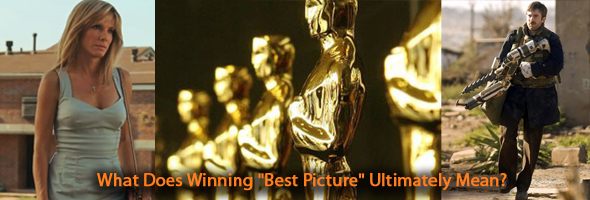When it comes to the Oscars, the movie-going hoi polloi tends to segregate themselves into separate camps: some follow movie news religiously, eagerly awaiting the ceremony’s winners and losers, others just leave the ceremony on in the background because they can’t find anything to watch, while others can’t be bothered at all. To cater to those latter two camps who aren’t a lock for the ceremony’s ratings, the Academy has trimmed much fat from the show in order to make it a leaner, more engaging watch. Thus, as most of you may know, the crowned and coveted Best Picture category added five more notches to its belt of nominations, in hopes of widening the show’s audience (Note the nominations for The Blind Side and District 9 as exhibits A and B).
While District 9 is certainly worthy to be called one of the ten best films of the year, its being nominated with The Blind Side cheapens this honor and reveals it as what appears to be a simple grab at more spectators on March 7th. In the wake of decisions like this, numerous questions arise. Aside from asking “Why do I care?” (If you wind up watching on the 7th, you’re bound to be interested in some capacity), one can’t help but scratch their head and ponder: “What does this award mean?” and, depending on that answer, “Who deserves to win it?”
A couple of weeks ago, I was fortunate enough to take part in a discussion with The Film Stage creators Jordan Raup and Dan Mecca on the Oscar nods, and, naturally, said chat led us to Avatar Vs. The Hurt Locker trading blows for Best Picture, with the potential for Avatar to come out on top. Since this discussion, I’ve mused over the worth of the award and whether or not a hollow (albeit impressive) behemoth like Avatar deserves that heavy, gold bald guy. One might argue that the cultural and technological impact of James Cameron‘s masterpiece is too great to be ignored, therefore deserving highest marks. And a worthy argument it is. For proof of its infiltration into pop culture, look no further than Flickr.
However, consider for a second the Academy’s history with a cinematic shift like Avatar: The 1978 Academy Awards saw Star Wars garner eleven nods (one of them being Best Picture) and 7 statues (All technically and production-based). I certainly have no intention of beleaguering the point on Avatar‘s lackluster story, but in regards to the film’s quality beyond its phenomenal (I use the word readily) spectacle, almost all of the other 9 best picture noms were better films with better stories to tell.
So, alas, the question returns. Should films like Avatar (nominated for its impact) or The Blind Side and District 9 (nominated for variety’s sake) win top prize, what does that victory mean for the integrity of the title ‘Best Picture?’ Perhaps a better alternative would be to initiate a ‘Best Producer’ award into the lineup. Such an award deserves to go to James Cameron and Jon Landau for their efforts on Avatar — wrangling a production like that is no easy feat. In the producer’s stead, the Best Picture Oscar should be an ensemble award, given to all those who had a major hand in cultivating the highest quality film of a given year (Director, Producer, Writer, Editor, Actors [2 leads, 2 supporting]). With standards that award a film based solely on its overall quality, rather than its technical savvy or commercial appeal, Oscar might be able to give back the Best Picture category some of its dignity, and (hopefully) make it a title that actually means something to the audiences who were enthralled with the year’s best film to begin with.
So what do you think, folks? Do culturally popular, yet fundamentally flawed films deserve to be called ‘Best Picture?’ Could the ‘Best Producer’ award solve this issue, and if so, who else should the ‘Best Picture’ award go to?


